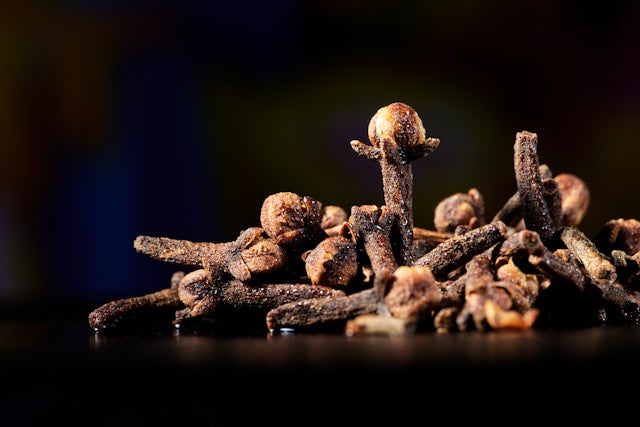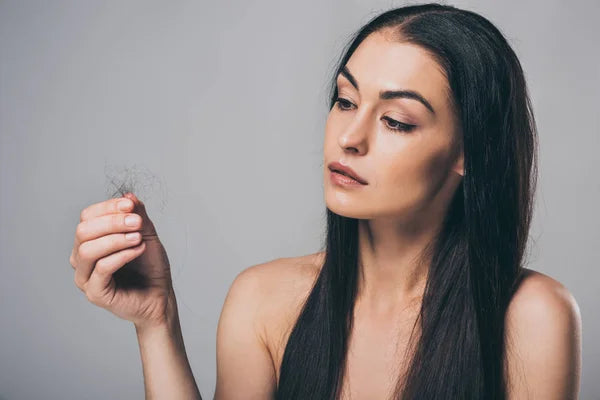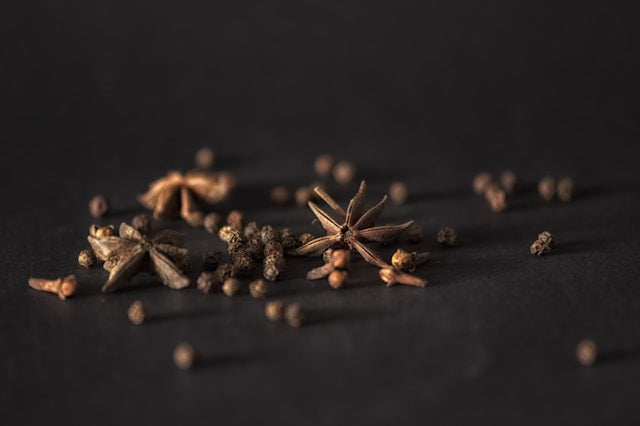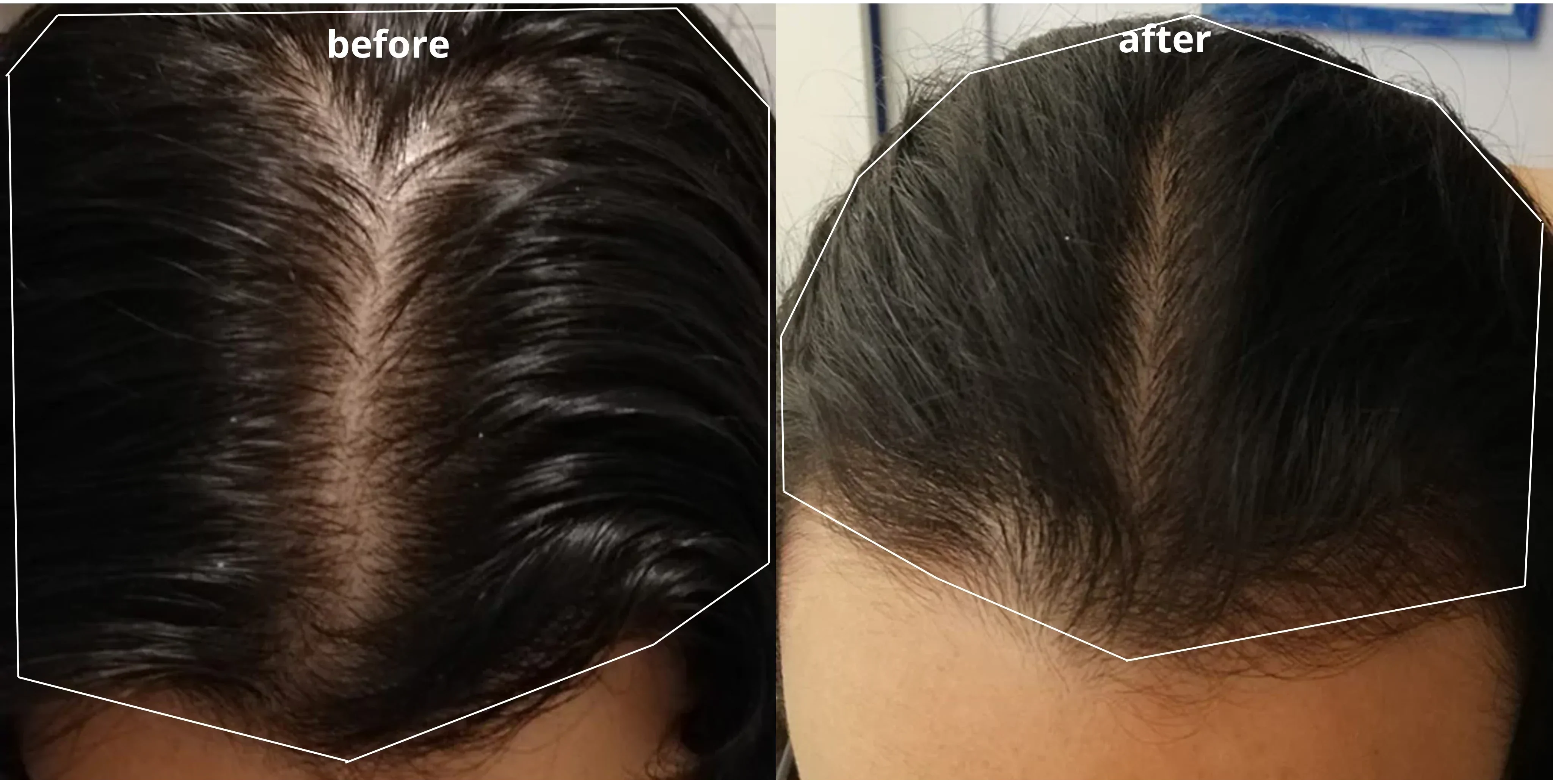Are you searching for a natural way to enhance hair growth? Cloves might just be the answer you're looking for.
Packed with essential nutrients, clove oil for natural hair growth has gained attention for its potential to strengthen and revitalize your locks.
In this article, we'll explore how this aromatic spice can be a game-changer in your hair care routine.
Table of content
Properties and compounds of cloves

Do cloves really boost hair growth? The evidence points to yes. Thanks to their rich antioxidant, antimicrobial, and antifungal properties, cloves can enhance scalp health and nourish hair follicles.
This spice, long cherished in traditional Chinese medicine and Ayurveda, is particularly notable for its high levels of eugenol—an antioxidant that combats oxidative stress known to cause various hair issues, from androgenetic alopecia to premature graying.
Cloves' antioxidants don't just fight free radicals; they also promote blood circulation to the scalp. This improves the health and activity of hair follicles, potentially leading to thicker, stronger hair.
By reducing inflammation and enhancing scalp health, cloves may help manage and even prevent conditions that lead to hair thinning and loss.
As your leading source for hair health information over the past 4 years, we never compromise on accuracy. When it comes to your health, you deserve information you can truly rely on - and earning your trust is our top priority.
Here's how Scandinavian Biolabs ensures every piece of content meets the highest standards of accuracy and integrity:
- Credentialed Experts: Our reviewers are actively practicing doctors and medical researchers
- Stringent Reviews: Content undergoes rigorous editing by subject specialists and review by a practicing doctor.
- Evidence-Based: We rely on well-established research from trusted scientific sources like peer-reviewed journals and health authorities.
- Full Transparency: Our editorial standards, writer credentials, reviewer credentials, correction process, and funding are all publicly documented.
- Independent Voice: While we do promote products, we operate in a vacuum to business operations. Our main goal is just an unwavering commitment to providing medically-sound guidance.
You can count on Scandinavian Biolabs to consistently deliver the trustworthy health information you deserve. Read our Editorial Standards.
Do cloves for hair growth really work?

The answer leans towards yes, primarily due to their potent anti-inflammatory properties. Chronic scalp inflammation can interrupt the normal hair growth cycle, contributing to hair loss. Conditions like seborrheic dermatitis, dandruff, and scalp psoriasis not only cause discomfort but can also hinder hair growth.
Cloves, rich in eugenol and gallic acid, reduce scalp inflammation and provide a soothing effect, alleviating itchiness and discomfort.
Gallic acid, in particular, is noted for preserving hair color and strength, while eugenol boosts blood flow to the scalp.
This enhanced circulation can rejuvenate damaged hair follicles, encouraging hair development and reducing the likelihood of hair loss.
By tackling inflammation directly, cloves offer a promising natural remedy for those seeking to improve their hair health and growth.
What are the benefits of cloves for hair growth?
Here’s how cloves can contribute to your hair care routine:
Scalp health
Clove's antibacterial and antimicrobial properties are a boon for scalp health. Applying clove oil to the scalp can create a healthier environment for natural hair, reducing the risk of infections that might hinder hair growth.
This means a cleaner, happier scalp and a better foundation for hair to thrive.
Improved blood circulation
It’s believed that clove oil can enhance blood circulation in the scalp, which is essential for stimulating hair follicles.
Better circulation means more nutrients and oxygen reach your hair roots, promoting stronger and faster hair growth.
Nutrient content
Packed with nutrients like vitamin E and beta-carotene, cloves offer antioxidants that help protect hair follicles from damage caused by oxidative stress.
This not only promotes hair health but also combats hair aging and weakening.
Hair strengthening
Cloves may help reduce hair breakage and improve overall hair quality. Regular use of clove water for hair can strengthen your hair, keeping it robust and vibrant.
Anti-inflammatory properties
The anti-inflammatory agents in cloves can shield the scalp from dandruff and related itchiness. This not only helps in maintaining a healthy scalp but also supports hair thickening and reduces hair fall.
Vitamin K and Eugenol
Vitamin K in cloves improves scalp circulation, enhancing hair growth and treating scalp issues like dandruff.
Meanwhile, eugenol found in clove oil promotes hair growth when applied to the roots and adds a healthy shine to hair.
What are the side effects of cloves for hair?

Here are some potential side effects to be aware of:
- Scalp irritation: Undiluted clove oil might cause redness, itching, burning, or stinging on sensitive scalps.
- Allergic skin reaction: Symptoms like hives, blistering, and severe itching may occur if you're allergic to cloves.
- Eye irritation: Clove oil can severely irritate or damage the eyes if contact occurs.
- Respiratory distress: Inhalation of clove oil or water can lead to breathing difficulties.
Additionally, clove oil can potentially interact with medications, especially blood thinners like Warfarin. Always consult with a healthcare provider before incorporating clove oil into your hair care regimen, particularly if you have underlying skin conditions or are on medication.
Alternatives to cloves for hair growth
Here are some effective alternatives that can help nourish your scalp and enhance hair growth:
Bio-Pilixin Activation Serum

When it comes to combating hair loss, Bio-Pilixin® Activation Serum is a name that often comes up. Developed through advanced stem cell technology, this serum is designed to nurture hair follicles and stimulate hair growth by improving blood flow and nutrient supply to the scalp.
But does it really work? Let's dive into what makes Bio-Pilixin® activation serum stand out.
This clinically tested formula has shown promising results in reducing hair thinning and encouraging new growth.
Within just 45 days, 77% of participants in a clinical study reported a noticeable reduction in hair loss, and by 150 days, 73% saw an increase in hair density. These numbers reflect not just hope but real results.
Moreover, what's truly reassuring for many users is witnessing less hair fall during showers within weeks of starting the treatment. It's these little signs that often give the biggest hope.
Bio-Pilixin is not just about growing hair but also about reducing the daily stress of losing it.
And the best part? If you're skeptical about the results, there’s no risk in giving it a try. Bio-Pilixin® comes with a 150-day money-back guarantee.
So you can feel confident about the investment in your hair health. With such a safety net, it’s easier to take the leap and see if Bio-Pilixin is the solution to your hair woes.
Rosemary for hair growth
Rosemary isn't just a kitchen favorite—it's also a powerhouse for hair health. Like cloves, rosemary is known for its ability to stimulate hair growth.
Try mixing it with a carrier oil like olive or coconut oil for a soothing scalp massage.
Alternatively, a rosemary water rinse after shampooing can invigorate the scalp and promote hair growth.
Green tea rinse
Make clove and green tea rinse your choice for hair care to take advantage of their rich antioxidant properties.
These antioxidants help fight off free radicals that can damage scalp health and hinder hair growth.
A simple green tea rinse can leave your scalp healthier, paving the way for stronger and fuller hair.
Scalp massage with carrier oils
Never underestimate the power of a good scalp massage with natural oils. Regular massages with oils such as coconut, jojoba, or almond can improve blood circulation to the scalp.
This not only relaxes you but also ensures that your hair follicles get all the nutrients they need to foster healthy hair growth.
Conclusion
Cloves offer a natural and potent option for enhancing hair growth and overall scalp health due to their rich antioxidant and anti-inflammatory properties.
However, if you're looking for variety or have sensitivity to cloves, alternatives like rosemary, green tea rinses, and scalp massages with carrier oils are excellent options to explore.
For those facing more significant hair thinning or loss, products like Bio-Pilixin Activation Serum provide scientifically backed solutions with promising clinical results.
Whichever path you choose, these natural and innovative approaches hold the key to healthier, stronger hair.
Remember, a little patience and consistency with these treatments can lead to visible and lasting results.
FAQs
Can I spray clove water on my hair every day?
It's recommended to use clove water once a week or as needed, rather than daily, to avoid potential irritation. Always conduct a patch test before regular use to ensure your skin does not react negatively.
Can I mix cloves in my shampoo?
Yes, you can mix cloves with your shampoo. Infuse crushed or powdered cloves in water for about 15-20 minutes, strain, and then blend one part of this clove infusion with two parts of your shampoo. Use this blend just like your regular shampoo for a nourishing effect.
What are the side effects of clove water?
Using clove water or oil can occasionally lead to side effects such as allergic reactions, skin irritation, or contact dermatitis. High doses or ingestion can be harmful, potentially causing severe health issues like seizures, liver and kidney damage, and even coma. Always use cloves in moderation and consult a healthcare provider if you experience adverse effects.
References:
- https://www.researchgate.net/publication/346755470_Hair_tonic_formulation_of_clove_leaves_Syzygium_aromaticum_ethanol_extract_and_the_effectiveness_on_rabbit_hair_growth
- https://www.ncbi.nlm.nih.gov/pmc/articles/PMC8405327/
- https://www.sciencedirect.com/science/article/abs/pii/S0944711306001383
- https://pubmed.ncbi.nlm.nih.gov/25842469/
- https://www.sciencedirect.com/science/article/pii/S2468227622001302
- https://www.ncbi.nlm.nih.gov/pmc/articles/PMC7595365/
- https://pubmed.ncbi.nlm.nih.gov/17092697/
- https://www.ncbi.nlm.nih.gov/pmc/articles/PMC2569505/
Read more:






